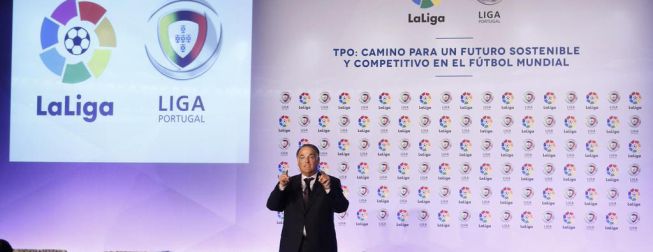The Spanish Football League supports the legality of investment funds
The Spanish Football League made public on Monday a report from the National Commission of Markets and Competition (CNMC), which states that investment funds, banned by FIFA since May, are legal in Spain. The League wanted to highlight that it supports the conclusions of the CNMC, who conducted the study at the request of the Superior Sports Council. The CNMC ruled on July 2nd that investment funds are legal in Spain, as prohibiting them would be unconstitutional. LaLiga has received the mandatory report from the CNMC with great satisfaction, reaffirming the conclusions reached by the Spanish organization.
LaLiga's position against the prohibition of Third Party Ownership
Since last December, when FIFA banned third-party ownership of football players' economic rights, known as TPO (Third Party Ownership), LaLiga has actively opposed the decision and taken appropriate legal actions. For this reason, the mandatory report from CNMC on "prohibition of third-party ownership of football players' economic rights" consolidates La Liga's position in favor of TPO.
The prohibition of TPO against economic freedoms
According to the CNMC's ruling, the ban on TPO "violates business freedom within the framework of a market economy, guaranteed and protected by Article 38 of the Spanish Constitution of 1978", as well as "fundamental freedoms of the Single Market established by the Treaty on the Functioning of the European Union (TFEU), such as the free movement of capital (Article 63), also affecting the free movement of workers (Article 45)." In the same report, the Competition Authority explains that this prohibition is "harmful to football, both for competition and for clubs and professionals. Lower remuneration and talent generation will result in less competitiveness and quality of the sector, which will ultimately harm consumer welfare."
An endorsement of LaLiga's vision
This decision by a Spanish organization confirms LaLiga's view on the legality of investment funds. Last April, during the "TPO: Path to a Sustainable and Competitive Future in World Football" forum held in Madrid, LaLiga President Javier Tebas emphasized the importance of national legislation in the process. "If we don't react, and TPO is the first thing, if we don't defend the national legislations that allow us to access these financing systems, we will end up with very localized professional football. We need investors, shared risks, we have to bring talent to be competitive," Tebas highlighted.
Support from reputable voices
Several reputable voices have publicly supported this view. Within the aforementioned TPO Forum, clubs like FC Porto, FC Twente, SL Benfica, and CR Flamengo expressed their support for its legality. Miguel Ángel Gil Marín, CEO of Atlético de Madrid, stated that "TPOs should be regulated, but never prohibited. In our case, investment funds have helped us compete and increased our income. If we are here, it is thanks to the support of TPOs. If the prohibition continues, everyone will seek their alternative." Similarly, Jesús Arroyo, Deputy Director General of Sevilla FC, expressed that "it is illogical to prohibit capital entry. Not allowing clubs to use these tools is not reasonable. It is not about modern slavery, what needs to be prohibited are certain practices and abuses."
Fighting against the prohibition
CNMC's ruling is just another step in the ongoing fight. LaLiga, together with the Portuguese League (LPFP), reported to the European Commission's Directorate-General for Competition in February the agreement adopted by FIFA to ban TPO. The two organizations argued in detail that this prohibition violates the competition defense rules of the Treaty on the Functioning of the European Union (TFEU) and constitutes an economic agreement that restricts the economic freedom of clubs, players, and third parties without any justification or proportionality. This prohibition harms clubs, especially those with fewer financial resources, preventing them from sharing the economic rights of professional players in their ranks with third parties and managing their financial obligations more prudently. LaLiga and LPFP trust that the European Commission will act quickly, initiating the relevant sanctioning proceedings against FIFA and nullifying the prohibition of TPO.
Legal action against FIFA
In addition, Doyen Sports, a private equity fund that provides financial assistance to football clubs, has filed a lawsuit with the Belgian national justice system to overturn FIFA's prohibition. In line with LaLiga's vision, Doyen Sports believes that FIFA's prohibition, which came into full effect on May 1st, will deprive clubs of a credible and sustainable source of financing, promoting greater competitive imbalance in favor of the world's richest clubs.

